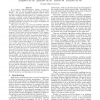Free Online Productivity Tools
i2Speak
i2Symbol
i2OCR
iTex2Img
iWeb2Print
iWeb2Shot
i2Type
iPdf2Split
iPdf2Merge
i2Bopomofo
i2Arabic
i2Style
i2Image
i2PDF
iLatex2Rtf
Sci2ools
132
click to vote
MICRO
2010
IEEE
2010
IEEE
Thread Cluster Memory Scheduling: Exploiting Differences in Memory Access Behavior
In a modern chip-multiprocessor system, memory is a shared resource among multiple concurrently executing threads. The memory scheduling algorithm should resolve memory contention by arbitrating memory access in such a way that competing threads progress at a relatively fast and even pace, resulting in high system throughput and fairness. Previously proposed memory scheduling algorithms are predominantly optimized for only one of these objectives: no scheduling algorithm provides the best system throughput and best fairness at the same time. This paper presents a new memory scheduling algorithm that addresses system throughput and fairness separately with the goal of achieving the best of both. The main idea is to divide threads into two separate clusters and employ different memory request scheduling policies in each cluster. Our proposal, Thread Cluster Memory scheduling (TCM), dynamically groups threads with similar memory access behavior into either the latency-sensitive (memory-n...
Hardware | Memory Access | MICRO 2010 | Threads | Throughput |
Related Content
| Added | 14 Feb 2011 |
| Updated | 14 Feb 2011 |
| Type | Journal |
| Year | 2010 |
| Where | MICRO |
| Authors | Yoongu Kim, Michael Papamichael, Onur Mutlu, Mor Harchol-Balter |
Comments (0)

